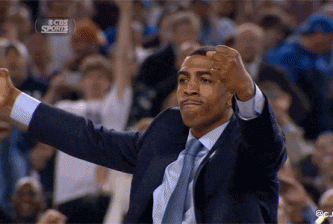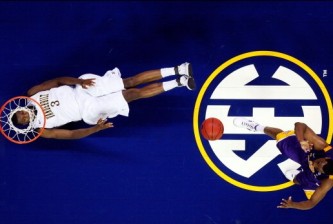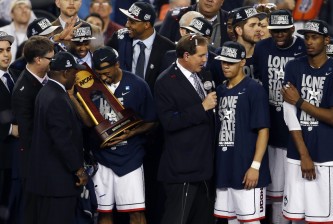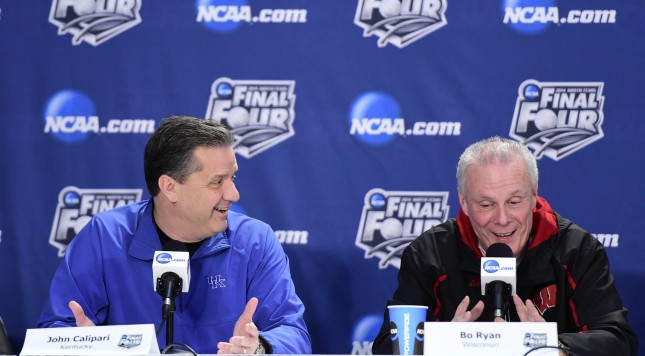Defense usually does win championships, but the Kentucky Wildcats have used this NCAA tournament to defy conventional wisdom. A team that could not get out of its own way at the offensive end of the floor for much of this season has finally gained a winning identity. Big Blue has played with the added confidence and attached lucidity that had been profoundly and conspicuously absent for four long, miserable months.
Saturday’s second national semifinal between the Wildcats and the cheeseheads from Wisconsin therefore offers a variation on a theme. In past seasons, a game involving Wisconsin would be largely if not entirely centered around the notion of “building a better mousetrap.” The Badgers’ primary aim would have been to find a way to blunt the skill and potency of the opposition.
This Saturday night in AT&T Stadium, that old and longstanding Wisconsin template will represent a part of the larger drama in Wildcats-Badgers, but it won’t exist in the same way or to the same extent. As was the case in Kentucky’s wins over Wichita State and Michigan, a 2014 NCAA Tournament game featuring Big Blue will probably be determined by the ability of two teams to max out on offense while limiting their weaknesses on defense.
*
When assessing each of these teams in a larger context, it is clear that their respective evolutions on offense, not defense, have brought them to the Final Four. It’s not as though defense will acquire a minimal degree of importance on Saturday; that’s certainly not what’s being suggested here. The point of emphasis is that Kentucky and Wisconsin are contending for a national title because of their growth on offense. Kentucky’s improvements have emerged in a very short period of time, whereas Wisconsin’s new-look offense has been in evidence for a number of months. Both the Wildcats and Badgers generally flourish when their offenses click, so while defenses win championships, it’s more than reasonable to say that offense will win this national semifinal in Arlington, Tex.
When looking at Kentucky’s offense, the biggest point of concern for Wisconsin — one that did not figure to be the case for any Kentucky opponent two weeks ago — is the Cats’ abundance of size and power on the glass… with Willie Cauley-Stein out of the picture.
The emergence of Dakari Johnson and Marcus Lee, whose talents were unlocked by the ever-resourceful John Calipari just in time for Big Blue Nation, leaves Wisconsin shorthanded in the paint. Julius Randle and Frank Kaminsky cancel each other out in Cats-Badgers, so the question becomes, “Can Nigel Hayes and the other members of Wisconsin’s supporting cast be positionally sound to the extent that they can consistently box out Johnson, Lee, and Alex Poythress on the boards?”
Another important question for Wisconsin to ask is this: “Realizing that Kentucky has become a much better three-point shooting team in this tournament relative to season averages, should we commit more help to the perimeter and extend our defensive pressure to contain James Young and Aaron Harrison, or should we focus on having everyone available to provide support on the glass?”
Precisely because Kentucky has a complete offensive team at the moment — one in which the perimeter players are carrying their fair share of the load, thereby complementing an improved and even more expansive frontcourt — Wisconsin must, at the very least, begin this game with the realization that it must concede something to Kentucky’s offense. Randle and Young are Kentucky’s two best offensive players right now, so there should be opportunities for Johnson and Aaron Harrison in the first eight minutes of play, before the under-12 media timeout. The flow of the first few segments of action will determine if — or how — the landscape will shift.
When looking at Wisconsin’s offense, the centrality of Frank Kaminsky has diverted attention from players who, for reasons both obvious and subtle, must come to the forefront on Saturday if the Badgers are going to win.
Wisconsin’s supporting cast will obviously need to supplement Kaminsky’s efforts in Saturday’s late game, but which performers will enable the Badgers to keep pace with Kentucky? There’s an obvious answer and then a less evident one.
Ben Brust will likely be one of the three primary supporting-cast players in this game (someone other than the Randle-Young-Kaminsky trio), and he’s even more likely to be the most important weather-vane player for Wisconsin. If he’s at his best, the Badgers’ chances of winning will skyrocket. If he’s relegated to the shadows, Wisconsin’s ability to win becomes severely compromised.
This point should not require much in the way of amplification. Brust has been Wisconsin’s most dangerous non-Kaminsky three-point shooter in this NCAA tournament. He helped rescue his team in the face of Oregon’s barrage in the round of 32, and he busted Baylor’s zone defense in the Sweet 16. Michigan and Wichita State both did a lot of damage to Kentucky’s defense on the perimeter over the past two weeks. Brust can very realistically force Kentucky to make some tough decisions on defense; if Kaminsky’s not the only Badger the Wildcats must contend with, Wisconsin can space the floor the way it wants to, and from that foundation, UW can outscore Big Blue in a shootout.
The discussion surrounding Wisconsin’s supporting cast becomes more intriguing (and cloudy) when Brust is not the point of focus. What other Badger can make the biggest difference on Saturday? You could provide several valid answers. Traevon Jackson’s ability to drive to the basket, combined with a longstanding penchant for hitting tough shots of varying lengths, could make him the off-the-radar key to Wisconsin’s efforts. Josh Gasser and Sam Dekker do not confine themselves to any one part of the court and will therefore have a chance to influence the flow of Kentucky-Wisconsin in different ways.
Yet, the player who has lurked in the background for Bucky in this NCAA tournament could be the most pivotal figure for the Badgers against Kentucky. Nigel Hayes — whose cleverness near the basket emerged for much of the Big Ten season — has regressed in March. His impact less pronounced and his effectiveness diminished, Hayes has not made Wisconsin’s recent opponents feel his presence. Yet, if he can step forward at this Final Four — becoming Wisconsin’s version of what Luke Hancock became for Louisville a year ago in Atlanta — Hayes can achieve two tactical goals for the Badgers with one stroke. He can reduce Kaminsky’s expected workload while opening the perimeter for Brust and Gasser.
*
The Final Four is such a cauldron of pressure. The crush of media attention, magnified by a full week removed from game action (compared to the previous two weeks of the NCAA tournament), creates a unique cocktail of emotions in which star players falter and role players ride to the rescue. This was certainly the case in last year’s Final Four, when Michigan’s Caris LeVert and Spike Albrecht provided substantial contributions that, if absent, would have prevented the Wolverines from beating Syracuse in the national semifinals. Similarly, Louisville wouldn’t have climbed past Wichita State had Hancock and Tim Henderson not helped out a scuffling Russ Smith.
Obvious game keys center around the foremost players on each team. For Kentucky, that cluster is Randle, Young, and Aaron Harrison. For Wisconsin, the lead pack consists of Kaminsky, Brust, and Dekker. As you watch Saturday’s game, pay attention to the comfort zone of these six players over the first 25 minutes. Notice how they start, how they adjust, and how they respond when they come out of the locker room in the second half, when gameday nerves should give way to a more settled demeanor guided by tunnel-vision focus.
If any members of this “significant six” play well below expectations, John Calipari and Bo Ryan will be able to concede more space to those players, allowing each coaching staff to apply more defensive pressure to a more urgent set of situational or matchup-based needs.
It’s only one person’s opinion, but much as hockey broadcasters pick a player to score a playoff overtime goal, Final Four semifinals — which are unlike most college basketball contests — also invite this parlor game involving the role players that need to click. For Kentucky, the choice here is Dakari Johnson. For Wisconsin, it’s Nigel Hayes.
Those selections might turn out to be substantially wrong; the much more important point is that someone is likely to emerge from the shadows, and that player — not one of the foremost stars in the firmament — could be the 19- or 20-year-old center of attention when Semifinal Saturday comes to a close.























